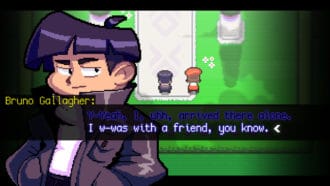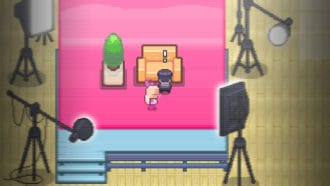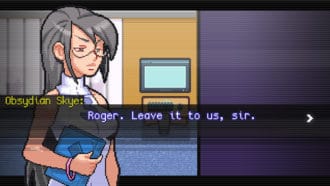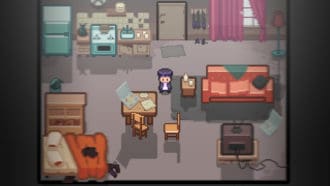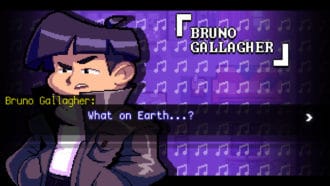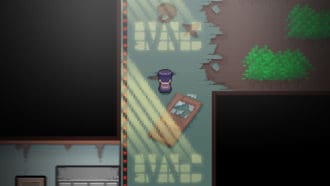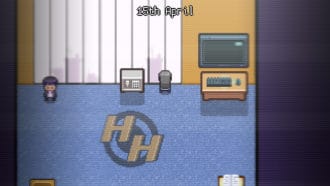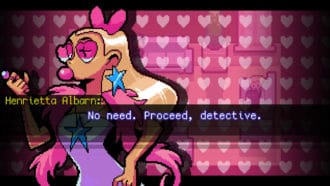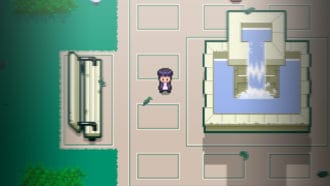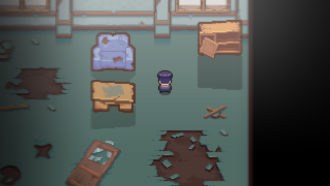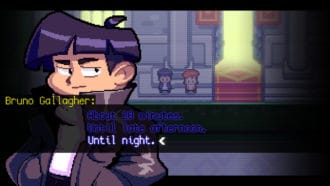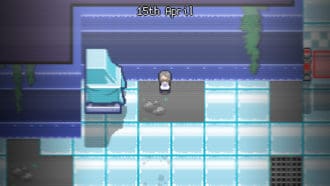Platforms:
PC, Nintendo Switch, Xbox Series X|S
Released:
January 17, 2023
Publisher:
Whitethorn Games
Developer:
Maitan69
Memories are fickle things. They are something that we often rely on whether it’s for exams, arguments, or even playing video games. RE:CALL is a visual novel puzzle adventure game that extends its hand towards memories. In RE:CALL, you play as Bruno Gallagher, someone who feels like a ghost is following them as they try and uncover a murder mystery. Not only that, but as Bruno, you will have to discover who the ghost really is, and why it’s given him the power to alter memories. Does RE:CALL create memorable moments? Or is the brain fog affecting you?
I never knew me a better time
Despite Bruno being the game’s protagonist, when RE:CALL begins, you’re actually playing as Javier who is currently in the office of Chester Make-Believe, also known as The Toy Maker. It starts as any good interrogation does. The person held captive is shaking in their boots, the interrogator doesn’t ‘want’ to hurt them. Javier spills the beans, and as you talk to Chester, you get to decide what really happened. Was it a green guard at the door? Or was it a blue guard? Each choice yields different results. Sort of like the movie Edge of Tomorrow, each time you ‘fail’, you learn something new. Maybe attacking the guard is a bad idea, what about lying to them, or sneaking past them? Who knows! But Chester knows something is up and in real time you’re also able to change your surroundings.
The next chapter is when you begin to play as Bruno who has a sudden weird feeling. This is where, arguably, the game begins. After talking to some characters, like Mrs Skye (the old lady) and Sonny Cash (the journalist), you bump into Lucas Brightside, an acquaintance of Bruno’s. You share comments back and forth until Henriette Albarn comes up. Henriette is the resident rich girl and someone Bruno has a crush on. Henriette will invite Bruno to an event at her place. Things go fine until the next scene has you talking to a detective who asks for you to recite the events leading up to a murder. This is where a lot of the mechanics you’ll learn come into play, and where Bruno’s inclination that something’s not right starts kicking up. The game will have you create people with your memories as you try to figure out who the killer is.
We were crazy, we were young
First off, RE:CALL looks great. You’ll be drawn in by the pixelated art style and impressed with the consistency of that pixel theme through the game’s font as well. Each character has their own personal style and background. Henrietta has pink hearts and a pink theme, and Bruno has a purple theme with purple music. The game will display events where you’re recalling a memory, showing off a TV static line effect, as you’d see on a CRT TV. Even in these memories, the portraits of the characters all have a glitch effect. And the side characters, called Forgotten, have some fantastic art attached to them too. They’re hollowed out almost and their faces are gaunt, without any defining characteristics like hair or clothes.
The quality of the art, especially the character portraits, is superb. Although it has to be said, the sprites for each character all look the same figure-wise. One of the biggest themes in RE:CALL is bullying, looking at fatphobia and fatshaming. A lot of the Forgotten and Lucas will bully and say nasty things to Bruno. While their portraits are unique, the sprite versions all look similar to Bruno, the one we’re told is heavy. This is a bit of a shame. The characters are all so different in shape, muscle, and even facial characteristics. And while one could argue that it’s all internalised, and for some characters it is, you still can’t help but notice the level of detail and variety is lost in the sprites when compared to the character portraits.
These memories lose their meaning
“Trauma can really screw with your head, to the point where it’s hard to remember what you went through.”
Fat-shaming is a major issue in this game. So be aware if that’s something that may upset you. It isn’t something I expected when booting up this game, and for the most part, games don’t deal with issues like this. There aren’t that many fat characters across gaming to begin with, and there certainly aren’t that many main characters who are fat. But, even if fat-shaming or fatphobia upsets you, I highly recommend playing this game. I cried while playing this game. Fatness is something that is present in my life, and I’ve dealt with the exact same comments that Bruno gets. I still do. It is something I admittedly felt uneasy about. However, the exploration of these issues is amazing, important, and uncommon. It’s also not the only theme the game deals with, in fact, it’s far from it.
The game showcases how to deal with prejudice and bullying. You can continue with the depression and hatred towards people. To be mad about how they see themselves. But you can also come at things with kindness. You can turn what you’ve experienced and be nice to people, not letting their views impact you.
Hurt people hurt people. It’s the main lesson of this game. To recall means to remember a past memory. Trauma can really screw with your head, to the point where it’s hard to remember what you went through. And bullying does affect people. It’s evident in the bitterness Bruno showcases. There are also times when you play as a young Bruno, someone who isn’t affected by the name-calling, and you see so much kindness in him. Yes, the world shouldn’t be so mean, but we can turn hurt into something good.
Only blue talk and love
Throughout the game, the music and sound stand out a lot. RE:CALL doesn’t have any voice acting, but each letter that the character says has a sound to it. Each character has a different weight to their sounds. This is similar to other visual novels like Ace Attorney and the Professor Layton series. Henrietta’s voice is light, whereas the detective’s is deeper. Speaking of Professor Layton, RE:CALL’s music has the same whimsicalness to it, and the game is chock full of musical references.
RE:CALL features Depeche café (named after the band Depeche Mode) and characters like Dominik NewOrder (after the band New Order) and Lucas Brightside (named after Mr. Brightside by The Killers). Harry Ocean is presumably named after Frank Ocean, with his colour scheme being orange, a nod to Frank Ocean’s debut album Channel Orange. Bruno’s last name is Gallagher, named after the Gallagher twins from Oasis. There’s detective Gioeli De La Soul, with Gioeli being the last name of Johnny Gioeli from Crush 40 who has made music for Sonic the Hedgehog. De La Soul is also the name of a hip-hop group. The Albarn family is named after Damon Albarn from Blur and the Gorillaz. That’s already a lot but there’s still a whole bunch more that I’ll let you discover on your own. I had a lot of fun trying to figure out what the references were and it made the game feel all that more special and meaningful.
How can we make it back there?
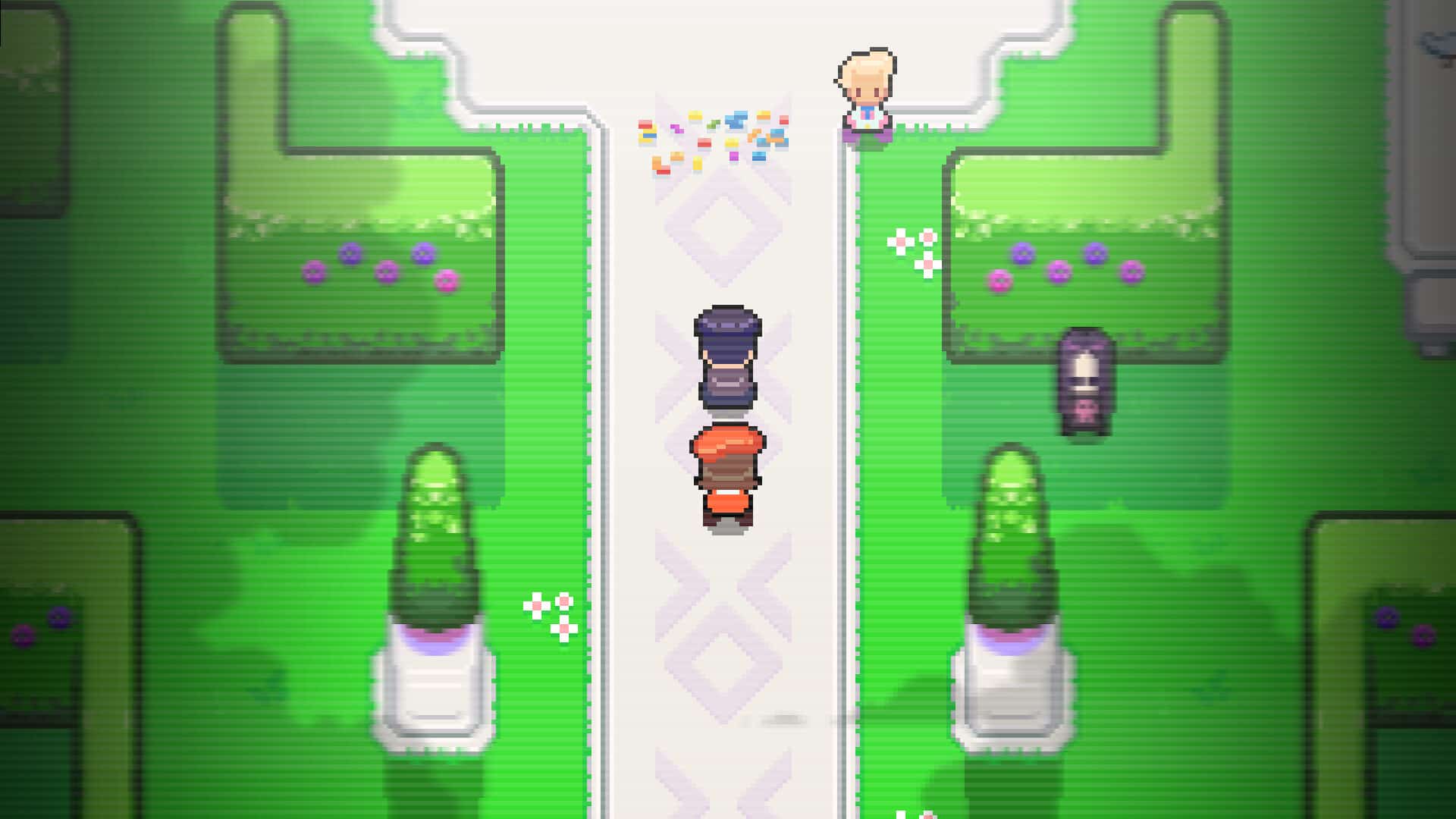
RE:CALL not only brings up the discussion of trauma and memory. It also discusses problems with the police. Specifically about how society views them. Playing as Dominik NewOrder, you speak to an officer who likes to beat up ‘junkies’. Another officer will mention that he sells their guns to ‘hood gangs’. The last officer you speak to asks for you to go to trial and speak on the behalf of another cop. This one’s accused of “some stuff with his wife”, implying that it’s domestic abuse, something that has happened historically with officers. It doesn’t tread lightly on these areas. And while you might be going into a system to try and tear it down, sometimes you help the system in the end.
The game has honest opinions and discussions on some hard truths. But that’s what I enjoyed about this game. I enjoyed how honest and raw everything is. What I enjoyed the most is Dominik telling Bruno “if you ever find yourself unsatisfied, simply change your narrative. It’s as easy as it sounds”. And as someone struggling with mental health issues, I hear that sort of stuff too often. Depressed? Be happy. Anxious? Stop being anxious. Fat? Lose weight. This sort of stuff isn’t as easy as it sounds. And it’s great to give those people a taste of their own lesson in the end.
Let the good times roll
I still do have some issues with the game, such as a lack of accessibility functions. Whilst it’s understandable for an indie game to be light on options and toggles, a few too many instances stood out to me as potentially problematic for those who have specific needs. There are some moments where the screen flashes, for instance. And even though I don’t suffer from epilepsy, it still felt a bit full-on. Along with that, there is no way to remap keys. I found the controls difficult to use at first but eventually got used to them. Having key remapping can range from being useful to downright necessary for some people, so it’s a shame for it not to be here.
Getting a bit more specific on the game’s controls on the PC, you’ll notice irregularities that are a little strange. The game uses z as an action key, this is also how you interact with things. The space bar does nothing, and the enter key is a pause button. I will admit that it feels nostalgic to use the arrow keys for movement, but those who grew up only knowing WASD may find themselves battling against muscle memory.
The game also has this weird blur effect on the side of the screen throughout. It uses a 9:16 aspect ratio, like a portrait photo. It’s a little annoying but I did my best to ignore it. Then in Chapter 5, there’s a teleportation device you can use to skip the stealth sections once you’ve completed them. But for some reason, this makes the unblurred parts blurred and the blurred parts unblurred. Again, it’s off-putting and jarring. The portraits don’t have this same effect, so I don’t know why it’s there.
Forget about the stupid little things
Despite oddities, the game took me places I never expected, and I always wanted to see where it’d go. A lot of the time I was hoping my theories would pay off in the end, and sometimes they did and sometimes they didn’t. But I enjoyed it because it kept me on my toes. RE:CALL has two endings, and I found one far more satisfying than the other, so I do wonder if that’s the ‘canon’ ending. The game itself also has a lot of meta jokes and comments. It knows when to take a joke and when things need to get serious.
This is a game that’s made me cry. I’ve honestly never connected with a character as strongly as I have with Bruno. RE:CALL is something I’ll probably be thinking about years down the line. It’s a quick game all up, but it’s a great game to start off your 2023.
8.5
Great
Positive:
- The story is impactful
- References out the wazoo!
- Art style is cute
- Music is whimsical
- Biting commentary
Negative:
- Lack of accessibility functions
- A strange blur on the sides permeates
- Controls are kind of weird
RE:CALL is something I won’t forget. With a strong storyline about your past and a huge set of characters, this game is really going for the jugular. There’s commentary on fatphobia, and accepting oneself. The references to bands and musicians make for a fun game in and of itself, and the whole experience is downright engaging. While there are issues when it comes to accessibility options and some strange choices, it didn’t drastically affect my enjoyment of the game. For something created by one person, there is a staggering amount of love and care put into RE:CALL.
